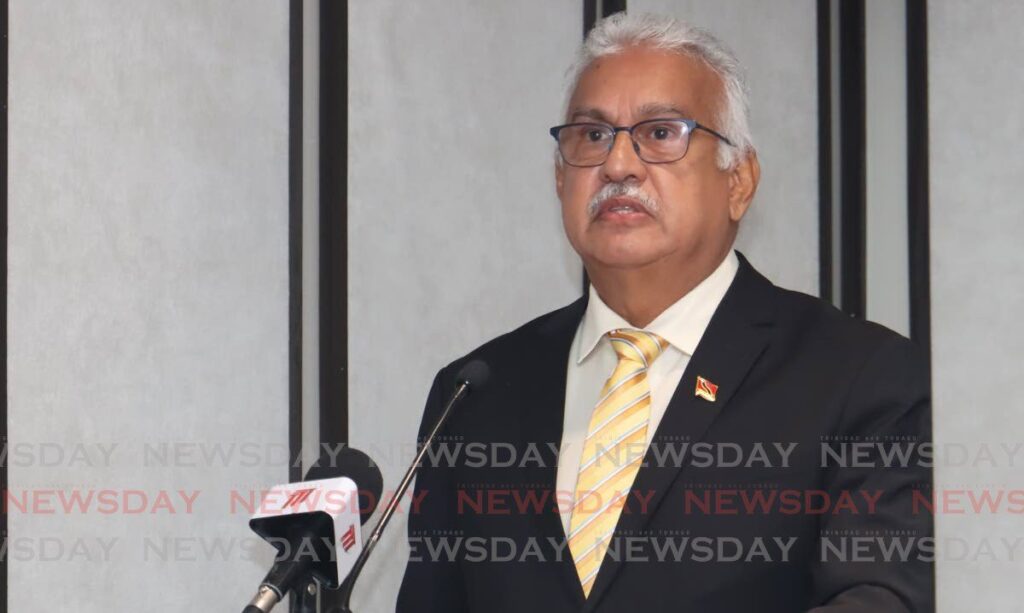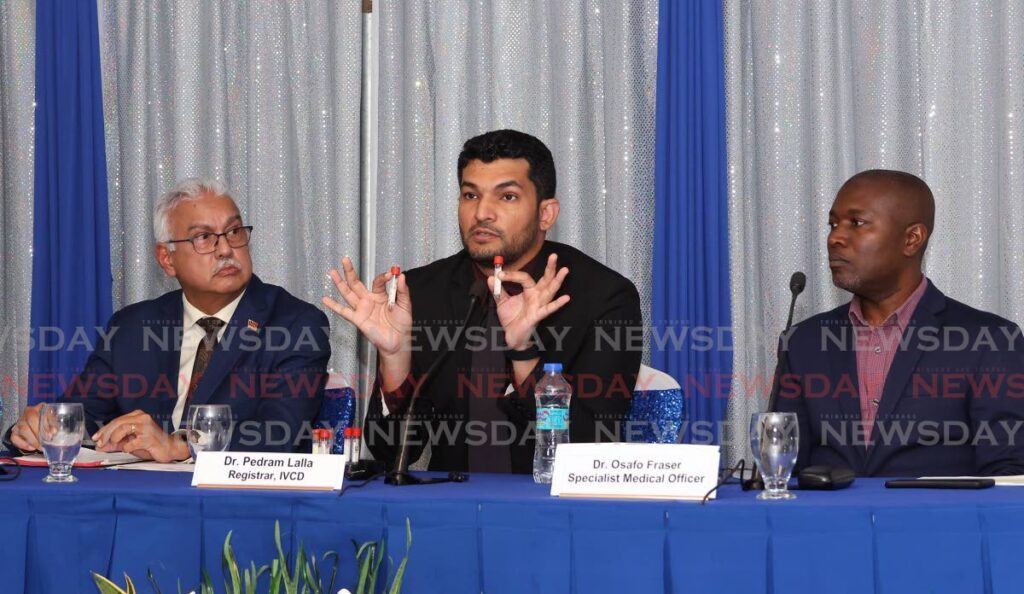Deyalsingh: Hostility to health inspectors from homeowners

HEALTH Minister Terrence Deyalsingh says public health inspectors have received hostility and non-co-operation from some homeowners when they try to check their premises for possible breeding sites for the Aedes aegypti mosquito, the vector for the dengue virus.
As a result of this, the ministry is collaborating with the Office of the Attorney General and Legal Affairs on the creation of a legal platform to address situations where people are not keeping their homes free of sites which could breed the mosquito.
He made this disclosure at a news conference at the San Fernando Teaching Hospital on July 25.
To date, Deyalsingh said public health inspectors have served 166 notices on homeowners who were found to have potential mosquito breeding sites at their homes.
At a news conference on July 10, Deyalsingh said the ministry will impose fines of up to $3,500 on people whose premises become breeding grounds for mosquitoes.
While he was thankful that most of these homeowners subsequently complied with the inspectors' requests to remove those sites and were not fined, Deyalsingh said inspectors have encountered others who were hostile to them and non-co-operative over letting them inspect their premises for potential mosquito breeding sites.
He reminded the media that the inspectors are empowered under the law.
"We don't want to charge people. We just want to encourage people to be responsible. So almost all (166 homeowners) have responded positively, which is good.
"It's not about charging people. But that is a resort that we will use if we have to. To protect people. To protect the elderly. To protect that ten-20 age group in which we are seeing 80 per cent of the (dengue) cases. To protect your neighbour."
Deyalsingh said he spoke earlier in the day with public health inspectors about the inspection of homes for potential mosquito breeding sites.
"We are developing a legal platform through the Ministry of Health which will go to the Attorney General to see what other legal measures can be implemented if we don't get the level of co-operation (needed)."
There are now 509 laboratory-confirmed dengue cases. The number of dengue deaths remains at five.
Deyalsingh responded to claims from some local government representatives that the ministry's Insect Vector Control Division (IVCD) was not operating at peak efficiency.
"On the issue of local government, IVCD is well-equipped and well-sourced to do IVCD's work. We will try to assist local government as far as we can. But IVCD cannot take over the work of 14 (local government corporations)."
Deyalsingh lamented that over the decades a false stereotype has been attached to the IVCD.
"IVCD has become synonymous with spraying. We look to IVCD as a big can of (insect) spray. That is not the mission or sole mission of IVCD."

The ministry's specialist medical officer Dr Osafa Fraser supported Deyalsingh's view. He said there has been a lot of collaboration and co-operation between the ministry and local corporations against dengue.
"A lot of that is going on. We are constantly in communication with the principal medical officers who run some of these corporations' IVCDs. We are deepening those relationships and those collaborative methods."
In addition to spraying, Fraser said the IVCD does a lot of house-to-house reduction work.
"That's a big part of what IVCD does. But we are also involved...whenever we have to respond to cases, quite apart from dealing with the sources. There are ways that we can deal with adult mosquitoes that are actually on the premises."
One way is ultra-low volume (ULV) spraying.
Fraser said, "That we do because you may end up with at least two cases in a quarter-mile radius. So in order to catch a lot of the adult mosquitoes that exist, we do that extensive work.
"But we also do targeted spraying to deal with the adults, which we call thermal fogging. We do that around the homes (where) we do have positive cases. We do that for the home (with the positive cases) and at least four houses around either side so we can catch that particular circuit."
Deyalsingh repeated that 75 per cent of a mosquito's life cycle is spent in clean, clear, stagnant water.
This point was underscored by Deyalsingh and Dr Pedram Lalla of the IVCD displaying test tubes of clean, clear, stagnant water with live Aedes aegypti mosquitoes in them.
Those were compared with ones with dirty, stagnant water with dead Aedes aegypti mosquito larvae in them. The water in these tubes came from the Caroni Swamp and drains.
Lalla said the larvae were put in all the tubes at the same time, two days ago.
He added that the mosquitoes which inhabit drains or swampy areas are Culex mosquitoes, and do not transmit dengue.
Deyalsingh said this puts to bed what he said was erroneous reporting by some elements of the media that mosquitoes found in bodies of unclear, stagnant water spread dengue.
"Yes, those environments exist, but the evidence is dengue is predominantly a factor of clean, clear, standing water in small to medium household containers.
"There is a difference between correlation and causation. It is an error that the media made during covid and we are making it again.
"Correlation does not mean causation."
That is, two things happening in succession does not always mean one caused the other.

Comments
"Deyalsingh: Hostility to health inspectors from homeowners"